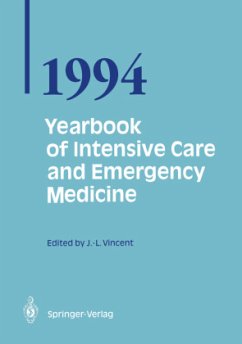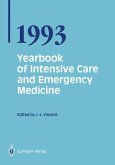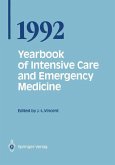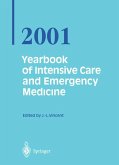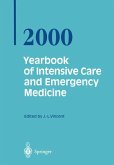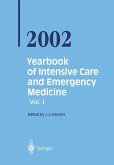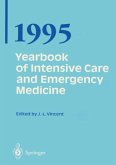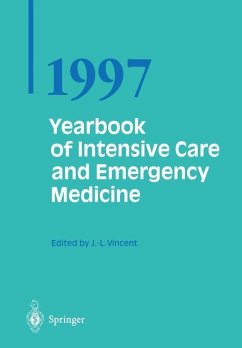Jean-Louis Vincent
Yearbook of Intensive Care and Emergency Medicine 1994
Edited by Vincent, Jean-Louis
Jean-Louis Vincent
Yearbook of Intensive Care and Emergency Medicine 1994
Edited by Vincent, Jean-Louis
- Broschiertes Buch
- Merkliste
- Auf die Merkliste
- Bewerten Bewerten
- Teilen
- Produkt teilen
- Produkterinnerung
- Produkterinnerung
The yearbook compiles the most recent, widespread developments of experimental and clinical research and practice in one comprehensive reference book. It is an excellent source for all clinical physicians.
Andere Kunden interessierten sich auch für
![Yearbook of Intensive Care and Emergency Medicine 1993 Yearbook of Intensive Care and Emergency Medicine 1993]() Jean-Louis VincentYearbook of Intensive Care and Emergency Medicine 199382,99 €
Jean-Louis VincentYearbook of Intensive Care and Emergency Medicine 199382,99 €![Yearbook of Intensive Care and Emergency Medicine 1992 Yearbook of Intensive Care and Emergency Medicine 1992]() Jean-Louis VincentYearbook of Intensive Care and Emergency Medicine 199281,99 €
Jean-Louis VincentYearbook of Intensive Care and Emergency Medicine 199281,99 €![Yearbook of Intensive Care and Emergency Medicine 2001 Yearbook of Intensive Care and Emergency Medicine 2001]() Jean-Louis VincentYearbook of Intensive Care and Emergency Medicine 2001163,99 €
Jean-Louis VincentYearbook of Intensive Care and Emergency Medicine 2001163,99 €![Yearbook of Intensive Care and Emergency Medicine 2000 Yearbook of Intensive Care and Emergency Medicine 2000]() Prof. Jean-Louis VincentYearbook of Intensive Care and Emergency Medicine 200038,99 €
Prof. Jean-Louis VincentYearbook of Intensive Care and Emergency Medicine 200038,99 €![Yearbook of Intensive Care and Emergency Medicine 2002 Yearbook of Intensive Care and Emergency Medicine 2002]() Prof. Jean-Louis VincentYearbook of Intensive Care and Emergency Medicine 200238,99 €
Prof. Jean-Louis VincentYearbook of Intensive Care and Emergency Medicine 200238,99 €![Yearbook of Intensive Care and Emergency Medicine Yearbook of Intensive Care and Emergency Medicine]() Jean-Louis VincentYearbook of Intensive Care and Emergency Medicine42,99 €
Jean-Louis VincentYearbook of Intensive Care and Emergency Medicine42,99 €![Yearbook of Intensive Care and Emergency Medicine 1997 Yearbook of Intensive Care and Emergency Medicine 1997]() Jean-Louis VincentYearbook of Intensive Care and Emergency Medicine 1997113,99 €
Jean-Louis VincentYearbook of Intensive Care and Emergency Medicine 1997113,99 €-
-
-
The yearbook compiles the most recent, widespread developments of experimental and clinical research and practice in one comprehensive reference book. It is an excellent source for all clinical physicians.
Hinweis: Dieser Artikel kann nur an eine deutsche Lieferadresse ausgeliefert werden.
Hinweis: Dieser Artikel kann nur an eine deutsche Lieferadresse ausgeliefert werden.
Produktdetails
- Produktdetails
- Yearbook of Intensive Care and Emergency Medicine Nr.1994
- Verlag: Springer / Springer Berlin Heidelberg / Springer, Berlin
- Artikelnr. des Verlages: 978-3-540-57613-6
- Softcover reprint of the original 1st ed. 1994
- Seitenzahl: 868
- Erscheinungstermin: 9. März 1994
- Englisch
- Abmessung: 242mm x 170mm x 47mm
- Gewicht: 1420g
- ISBN-13: 9783540576136
- ISBN-10: 3540576134
- Artikelnr.: 29009628
- Herstellerkennzeichnung Die Herstellerinformationen sind derzeit nicht verfügbar.
- Yearbook of Intensive Care and Emergency Medicine Nr.1994
- Verlag: Springer / Springer Berlin Heidelberg / Springer, Berlin
- Artikelnr. des Verlages: 978-3-540-57613-6
- Softcover reprint of the original 1st ed. 1994
- Seitenzahl: 868
- Erscheinungstermin: 9. März 1994
- Englisch
- Abmessung: 242mm x 170mm x 47mm
- Gewicht: 1420g
- ISBN-13: 9783540576136
- ISBN-10: 3540576134
- Artikelnr.: 29009628
- Herstellerkennzeichnung Die Herstellerinformationen sind derzeit nicht verfügbar.
Sepsis.- Infection and the Host Septic Response: Implications for Clinical Trials of Mediator Antagonism.- Cytokine Markers of the Human Response to Sepsis.- Heat Shock Proteins in Critical Illness: Markers of Cellular Stress or More?.- A Prophylactic Approach towards Postoperative Endotoxemia.- The Protective Role of Interleukin-10 in Sepsis.- Treatment of Sepsis: A New Look at Prostacyclin.- Nitric Oxide in Sepsis and ARDS.- Is Inhibition of Nitric Oxide Synthase an Appropriate Therapeutic Target in Sepsis?.- Nitric Oxide Synthase Inhibition in Septic Shock.- Role of Nitric Oxide in the Regulation of Vascular Tone in Septic Shock.- Administration of Methylene Blue in Septic Shock: Is it Beneficial?.- Effects of Endogenous Nitric Oxide on the Pulmonary Circulation.- Inhalation of Nitric Oxide in Severe ARDS.- Oxygen Delivery.- Nuclear Magnetic Resonance Spectroscopy: Insights into Experimental Septic Shock.- Temporal Patterns of DO2 and V?O2: Predictions of Outcome and Therapeutic Goals.- The Cardiac Index/Oxygen Extraction Diagram to Assess Hemodynamic Status.- A New Debate: Colloid versus Colloid?.- Inotropic Agents.- Effects of Catecholamine Therapy on Regional Blood Flow and Tissue Oxygenation in Septic Shock.- Gastric Tonometry.- Regional versus Global Indicators of Tissue Oxygenation.- Recent Advances in Gastric Tonometry.- Management of Gastric Intramucosal Acidosis.- Oxygen Carriers.- The Optimal Hematocrit.- The Role of Perfluorochemicals in Surgery and the ITU.- The Pressor/Perfusion Effect of Diaspirin Cross-Linked Hemoglobin.- Hemoglobin-based Red Cell Substitutes: Preliminary Human Studies.- Cardiac Crisis.- Ischemic Preconditioning: A Pronounced and Endogenous Form of Protection against Tissue Injury.- The Investigation of the Patient withPalpitations.- Cardiogenic Shock: How should we Revascularize?.- Poisoning with Class I and IV Antiarrhythmic Agents.- Perioperative Cardiac Complications.- Perioperative Mortality is Reduced by Cardiovascular Optimization.- Perioperative Metabolic and Hemodynamic Changes in Adults and Children.- Heart-Lung Interactions.- Defining the Limits of Heart-Lung Interactions.- Pulmonary Hypertension in Congenital Heart Diseases.- Atrial Natriuretic Peptide Modulates Pulmonary Pathophysiology.- CPR.- Priorities in Advanced Cardiac Life Support.- Glucose Worsens and Tirilizad Improves Neurologic Outcome of CPR.- Ethical Issues in Resuscitation.- Acute Respiratory Failure.- Acute Respiratory Failure in Infants and Children: Status Report on Gas Exchange Techniques and Outcome.- Stress Proteins and Acute Lung Injury.- Acute Lung Injury: Experimental Approaches to Treatment.- Bedside Detection of Microvascular Injury and Edema in the Lungs.- Adult Respiratory Distress Syndrome (ARDS) in Infants and Children.- Risk Factors and Outcome in ARDS.- Lung Mechanics.- Intrinsic PEEP.- Measurement of Lung Volumes and Gas Distribution during Mechanical Ventilation.- Mechanical Ventilation.- Protocol Control of Mechanical Ventilation in ARDS.- Tracheal Gas Insufflation as an Adjunct to Conventional Ventilation.- Advantages and Rationale for Pressure Controlled Ventilation.- Humidification and Filtration.- Use of Heat and Moisture Exchangers in Mechanically Ventilated Patients.- Non-Invasive Positive Pressure Ventilation for Acute Respiratory Failure.- Chronic Obstructive Pulmonary Disease.- Work of Breathing in COPD.- Gas Exchange in COPD.- Infectious Aspects of Acute Exacerbations of COPD.- Severe Infections.- Antibiotic-Resistant Pathogens in the ICU: Epidemiology and Control.- Severe Community-Acquired Pneumonia: A New Clinical Entity.- Pneumonia: Cause or Symptom of Postinjury Multiple Organ Failure?.- Candida Infections in Critically Ill Patients.- Neurologic Crisis.- Intracranial Pressure: Its Measurement and Treatment.- New Insights in the Management of Acute Neurologic Crises using Jugular Bulb Oximetry.- Bedside Estimation of Cerebral Blood Flow.- Acquired Neuromuscular Abnormalities in Intensive Care Patients.- Renal Failure.- Continuous High Flux Dialysis (CHFD).- The Hepatorenal Syndrome.- Acid-Base Balance.- Use of the Anion Gap in Intensive Care and Emergency Medicine.- Diagnostic Work-up of Severe Metabolic Acidosis.- Intoxications.- Basis of Kinetics in Clinical Toxicology.- Acute Pulmonary Damage by Toxic Substances: New Aspects of Therapy.- Severe Trauma.- Prehospital Critical Care Services.- The Prevention of Tetanus: The Story of 100 Years.- Metabolic Support.- Glutamine Parenteral Nutrition in Critical Illness.- Catabolism - Potential for Amelioration by Growth Factors.- Evaluation, Monitoring and Outcome Prediction.- Small Trials in Critical Care Medicine: What can Intensivists learn from them?.- Dutch Specification Study of an Intensive Care Information System.- The SAPS II: A New Score with New Objectives.- The MPM II System for ICU Patients.- Ethics.- Care of the Dying Patient.- Quality of Life after Intensive Care.
Sepsis.- Infection and the Host Septic Response: Implications for Clinical Trials of Mediator Antagonism.- Cytokine Markers of the Human Response to Sepsis.- Heat Shock Proteins in Critical Illness: Markers of Cellular Stress or More?.- A Prophylactic Approach towards Postoperative Endotoxemia.- The Protective Role of Interleukin-10 in Sepsis.- Treatment of Sepsis: A New Look at Prostacyclin.- Nitric Oxide in Sepsis and ARDS.- Is Inhibition of Nitric Oxide Synthase an Appropriate Therapeutic Target in Sepsis?.- Nitric Oxide Synthase Inhibition in Septic Shock.- Role of Nitric Oxide in the Regulation of Vascular Tone in Septic Shock.- Administration of Methylene Blue in Septic Shock: Is it Beneficial?.- Effects of Endogenous Nitric Oxide on the Pulmonary Circulation.- Inhalation of Nitric Oxide in Severe ARDS.- Oxygen Delivery.- Nuclear Magnetic Resonance Spectroscopy: Insights into Experimental Septic Shock.- Temporal Patterns of DO2 and V?O2: Predictions of Outcome and Therapeutic Goals.- The Cardiac Index/Oxygen Extraction Diagram to Assess Hemodynamic Status.- A New Debate: Colloid versus Colloid?.- Inotropic Agents.- Effects of Catecholamine Therapy on Regional Blood Flow and Tissue Oxygenation in Septic Shock.- Gastric Tonometry.- Regional versus Global Indicators of Tissue Oxygenation.- Recent Advances in Gastric Tonometry.- Management of Gastric Intramucosal Acidosis.- Oxygen Carriers.- The Optimal Hematocrit.- The Role of Perfluorochemicals in Surgery and the ITU.- The Pressor/Perfusion Effect of Diaspirin Cross-Linked Hemoglobin.- Hemoglobin-based Red Cell Substitutes: Preliminary Human Studies.- Cardiac Crisis.- Ischemic Preconditioning: A Pronounced and Endogenous Form of Protection against Tissue Injury.- The Investigation of the Patient withPalpitations.- Cardiogenic Shock: How should we Revascularize?.- Poisoning with Class I and IV Antiarrhythmic Agents.- Perioperative Cardiac Complications.- Perioperative Mortality is Reduced by Cardiovascular Optimization.- Perioperative Metabolic and Hemodynamic Changes in Adults and Children.- Heart-Lung Interactions.- Defining the Limits of Heart-Lung Interactions.- Pulmonary Hypertension in Congenital Heart Diseases.- Atrial Natriuretic Peptide Modulates Pulmonary Pathophysiology.- CPR.- Priorities in Advanced Cardiac Life Support.- Glucose Worsens and Tirilizad Improves Neurologic Outcome of CPR.- Ethical Issues in Resuscitation.- Acute Respiratory Failure.- Acute Respiratory Failure in Infants and Children: Status Report on Gas Exchange Techniques and Outcome.- Stress Proteins and Acute Lung Injury.- Acute Lung Injury: Experimental Approaches to Treatment.- Bedside Detection of Microvascular Injury and Edema in the Lungs.- Adult Respiratory Distress Syndrome (ARDS) in Infants and Children.- Risk Factors and Outcome in ARDS.- Lung Mechanics.- Intrinsic PEEP.- Measurement of Lung Volumes and Gas Distribution during Mechanical Ventilation.- Mechanical Ventilation.- Protocol Control of Mechanical Ventilation in ARDS.- Tracheal Gas Insufflation as an Adjunct to Conventional Ventilation.- Advantages and Rationale for Pressure Controlled Ventilation.- Humidification and Filtration.- Use of Heat and Moisture Exchangers in Mechanically Ventilated Patients.- Non-Invasive Positive Pressure Ventilation for Acute Respiratory Failure.- Chronic Obstructive Pulmonary Disease.- Work of Breathing in COPD.- Gas Exchange in COPD.- Infectious Aspects of Acute Exacerbations of COPD.- Severe Infections.- Antibiotic-Resistant Pathogens in the ICU: Epidemiology and Control.- Severe Community-Acquired Pneumonia: A New Clinical Entity.- Pneumonia: Cause or Symptom of Postinjury Multiple Organ Failure?.- Candida Infections in Critically Ill Patients.- Neurologic Crisis.- Intracranial Pressure: Its Measurement and Treatment.- New Insights in the Management of Acute Neurologic Crises using Jugular Bulb Oximetry.- Bedside Estimation of Cerebral Blood Flow.- Acquired Neuromuscular Abnormalities in Intensive Care Patients.- Renal Failure.- Continuous High Flux Dialysis (CHFD).- The Hepatorenal Syndrome.- Acid-Base Balance.- Use of the Anion Gap in Intensive Care and Emergency Medicine.- Diagnostic Work-up of Severe Metabolic Acidosis.- Intoxications.- Basis of Kinetics in Clinical Toxicology.- Acute Pulmonary Damage by Toxic Substances: New Aspects of Therapy.- Severe Trauma.- Prehospital Critical Care Services.- The Prevention of Tetanus: The Story of 100 Years.- Metabolic Support.- Glutamine Parenteral Nutrition in Critical Illness.- Catabolism - Potential for Amelioration by Growth Factors.- Evaluation, Monitoring and Outcome Prediction.- Small Trials in Critical Care Medicine: What can Intensivists learn from them?.- Dutch Specification Study of an Intensive Care Information System.- The SAPS II: A New Score with New Objectives.- The MPM II System for ICU Patients.- Ethics.- Care of the Dying Patient.- Quality of Life after Intensive Care.

